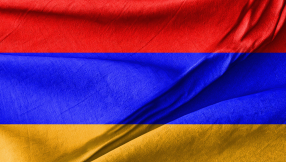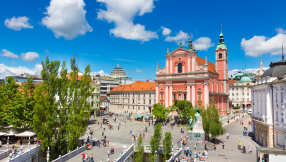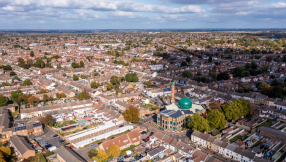Colombia rescues Betancourt
The rescue - without a shot being fired - was a huge blow to Latin America's oldest insurgency, already badly weakened by President Alvaro Uribe's U.S.-backed campaign to defeat the rebels and the cocaine trade fueling Colombia's conflict.
Betancourt, 46, a dual French-Colombian citizen and former presidential candidate, was the highest-profile captive held by the Revolutionary Armed Forces of Colombia, known as FARC, and had been a held in the Colombian jungle for six years.
"I believe that this is a sign of peace for Colombia, that we can find peace," Betancourt said, weeping as she thanked the Colombian military in her first public comments, carried on Colombian radio station Caracol.
Minutes later, a pale but smiling Betancourt landed at Bogota's air force base, walking down the stairs of the plane and hugging her mother, Yolanda Pulecio, on the runway.
Betancourt had not been seen since a rebel video broadcast last year in which she appeared gaunt and depressed in a jungle camp. The video provoked outrage in Colombia and overseas as former fellow hostages later told how she had been chained up after repeated escape attempts.
She said the hostages were forced onto a helicopter handcuffed, but were then amazed to see their captors disarmed as the aircraft took off, describing an action film ending to her captivity when one army officer said, "You are free."
The operation, from the helicopter's landing to the disarming of the two guerrillas on board, took 22 minutes and 13 seconds, said Gen. Freddy Padilla, head of Colombia's armed forces. The two rebels were in custody.
Defence Minister Juan Manuel Santos said Colombian military intelligence had infiltrated the guerrilla movement in the southern jungle province of Guaviare, where soldiers posed as members of a fictitious aid group that was to fly the hostages by helicopter to a camp to meet a rebel commander.
"It was an intelligence operation comparable with the greatest epics of human history, but without a drop of blood being spilled, without one weapon being fired," Uribe said.
Fifteen long-held kidnap victims were rescued in all.
The FARC has been holding about 40 high-profile hostages it has sought to exchange for jailed rebels. But attempts to reach negotiate their release have failed.
In a late-night televised address, Uribe said he will not rest until all FARC hostages are freed and invited the rebels to talk. Betancourt looked on as he spoke from the presidential palace and then spoke herself, recounting the rescue.
AMERICANS EN ROUTE HOME
The freed Americans worked for Northrop Grumman and were captured in 2003 after their aircraft crashed in the jungle during a counternarcotics operation.
The former Defence Department contract workers, Marc Gonsalves, Keith Stansell and Thomas Howes, returned to the United States on Wednesday evening.
U.S. President George W. Bush spoke by telephone with Uribe and praised the rescue operation, the White House said.
In Paris, French President Nicolas Sarkozy said, "Today a nightmare of more than six years has ended." Sarkozy, who had had made vigorous efforts to seek Betancourt's freedom, sent his foreign minister, Bernard Kouchner, to Colombia.
"I am filled with happiness," Betancourt's sister, Astrid, told Colombian radio. "These have been long years of waiting."
Betancourt was kidnapped by the FARC while campaigning for the presidency in 2002 when, against the advice of the armed forces, she travelled along a rural road in southern Colombia and was stopped at a rebel roadblock.
The presidents of Chile, Brazil and Peru praised Uribe for the rescue operation as a gain for peace and democracy.
Venezuelan President Hugo Chavez, a self-styled socialist revolutionary who has been at odds with Uribe over his support for the rebels, called the Colombian leader to congratulate him on the successful operation, Venezuelan state television said.
Chavez this year brokered the release of a group of hostages held by the FARC. But a Colombian army mission to kill a top FARC commander inside Ecuador triggered an Andean crisis that threatened to spill over into border violence.
Chavez, who had once called for more political recognition for the Marxist-inspired FARC, last month urged rebel commanders to release their hostages without conditions.
CONDITIONS FOR TALKS
The FARC has demanded that Uribe pull back troops from an area the size of New York City to facilitate talks.
Uribe, whose father was killed in a botched FARC kidnapping years ago, refuses to accept that condition. But he has offered a smaller safe haven under international observation in an area where there are no armed forces or armed groups.
The rescue weakens the FARC's position to negotiate as their ranks are thinned by military setbacks and desertions. But they hold scores more hostages for political leverage.
The outlawed rebel army, once a 17,000-member force able to attack cities and kidnap almost at will, has been driven back into remote areas and now has about 9,000 combatants. The guerrillas have lost three major leaders this year.
Listed as a terrorist group by U.S. and European officials, the FARC has used the cocaine trade to fund its operations.
Michael Shifter, an analyst at the Inter-American Dialogue, in Washington, said the rescue showed the FARC was in a serious organizational crisis.
"The Colombian government took advantage of the FARC's weakness and disarray to carry out the mission," he said. "It was a big gamble, but it worked."













